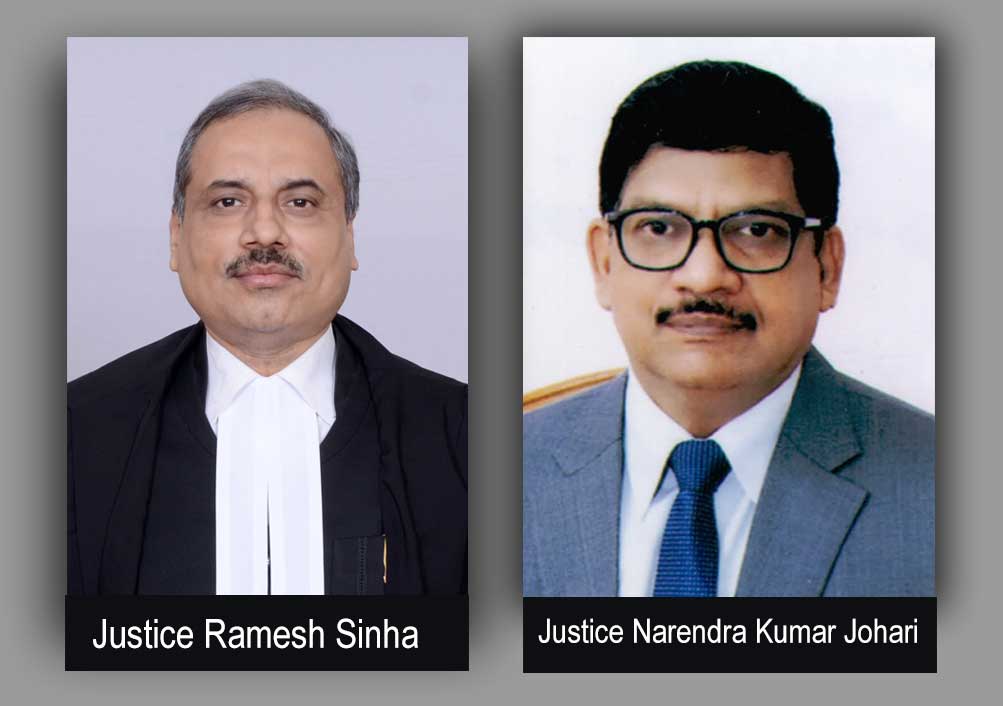Allahabad High Court upholds detention order of men who burnt alive girl

Read judgment: Lalit Gupta and Ors vs. U.O.I. Thru. Secy. Ministry Of Home Affairs, New Delhi & Ors
LE Staff
Lucknow, July 28, 2021: While upholding the detention order of a group of men who burnt alive a young college student, the Lucknow bench of the Allahabad High Court has ruled that the “heinous offence” falls within the contours of the concept of “public order” and the Detaining Authority was justified in law in passing the order of detention as its confirmation order against the accused.
A Division Bench of Justice Ramesh Sinha and Justice Narendra Kumar Johari observed that a detention order cannot be struck down on the ground that the proper course for the authority was to oppose the bail application.
It transpires from the grounds of detention that a young girl, who was a B.Sc. III Year student of Mahaveer Degree College, Raebareli, was called at Ram Naresh Hotel by the petitioners and other co-accused persons. After reaching the hotel she was kidnapped and tied with a rope and in a state of unconsciousness, she was burnt alive after pouring petrol on her, leading to her death.
This brutal murder in daylight led to lodging of FIR u/s 302, 201, 323, 506 of I.P.C and the petitioners were detained. In the meanwhile, the petitioners applied for bail before the High Court.
However, the Detaining Authority noted that there was possibility that the petitioners after their release would again indulge in such activities which were likely to adversely affect public order. Therefore, their detention became necessary under the National Security Act, 1980.
On the basis of report received from SHO, the Detaining Authority passed an order detaining the petitioners u/s 3(2) of the Act, 1980. The representation sent by petitioners through Superintendent of Jail, District Raibareli to the Detaining Authority, as well as to the State Government came to be rejected.
While challenging the detention orders as curtailment of personal liberty, the Counsel for the petitioner argued before the HC that the petitioners had no criminal history except the present alleged incident. He argued that the order of detention was passed without considering the fact that no identification parade has been carried out despite existence of alleged eye-witnesses.
Opposing the same, the Additional Government Advocate submitted that the activities of the petitioners were prejudicial to the maintenance of public order and their activities have disturbed the normalcy of the society. He further argued that the petitioners are men of criminal mentality.
The HC noted that the main question for consideration before it was whether the activities of the petitioners mentioned in the grounds of detention fall within realm of “public order” or “law and order”.
“For this gruesome act of the petitioners, the area of the locality became frightened and anger spread among the people. The public order was disrupted on account of daylight brutal murder of the student,” the bench held.
“On account of the said incident, the public order was completely breached,” it added.
The High Court found that the distinction between the two concepts of “public order” and “law and order” has been lucidly explained by the Apex Court in Ashok Kumar Vs. Delhi Administration, wherein the SC has observed that the true distinction between the areas of “public order” and “law and order”, being fine and sometimes overlapping, does not lie in the nature or quality of the act but in the degree and extent of its reach upon society.
The Apex Court in case of Ashok Kumar (supra) further observed that the act by itself is not determinant of its own gravity, rather, it is the potentiality of the act to disturb the even tempo of the life of the community which makes it “prejudicial to the maintenance of public order”.
“The stand that a single act cannot be considered sufficient for holding that public order was affected is clearly without substance. It is not the number of acts that matters. What has to be seen is the effect of the act on the even tempo of life, the extent of its reach upon society and its impact,” reiterated the Bench.
The Bench also found that the question was answered more appropriately and with all clarity in the case of Attorney General of India v. Amratlal Prajivandas , wherein the Apex Court ruled that it is beyond dispute that the order of detention can be passed on the basis of a single act.
“The test is whether the act is such that it gives rise to an inference that the person would continue to indulge in similar prejudicial activities. It cannot be said as a principle that one single act cannot be constituted the basis for detention. Thus, the argument of learned counsel for the petitioners that since it is solitary incident of the petitioners, he deserves sympathy, is rejected,” said the HC.
Sign up for our weekly newsletter to stay up to date on our product, events featured blog, special offer and all of the exciting things that take place here at Legitquest.




Add a Comment